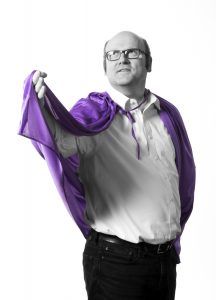From Doctor to Patient
From Doctor to Patient

If you were a brain tumor patient of Dr. Christian Grommes at Memorial Sloan Kettering in New York City, you would never know that a decade ago, he walked a similar journey and knows what it’s like to hear, “you have a brain tumor.”
With energy and humor in his voice, tinged with a German accent, Dr. Grommes recounts his frustrating month-long experience of unknowns.
“I started feeling dizzy and knew something wasn’t right,” recalls Dr. Grommes. “It got to the point where I had to take a bag with me because I kept vomiting each time I drove a car.”
Dr. Grommes knew his symptoms were neurological in nature. In fact, he was in the United States to research glioblastoma–one of the most aggressive forms of brain tumors. Hoping to uncover the cause of his unexplained symptoms—and find a treatment—he was referred to an ear-nose-throat doctor, who at first brushed off his concerns. But Dr. Grommes persevered—he insisted on having an MRI scan.
Dr. Grommes remembers the very day he learned the news. He analyzed the MRI results himself.
“It was a Friday afternoon and I was going to see my colleague’s new baby,” recalls Dr. Grommes. “After they dropped me off at the office, I was able to access my results and I saw the mass in my scan. I knew it was a brain tumor, and it had to come out.”
At age 27 and nearly 5,000 miles away from his home in Germany, Dr. Grommes was diagnosed with a choroid plexus papilloma, a rare type of brain tumor typically found in young children but one that can also affect adults. Luckily, his tumor was benign and contained.
Without question or pause, he knew he would fly home to have the tumor surgically removed by the neurosurgery team he studied with in Germany. Plus, he wanted to be around the comfort of his family while he was recovering. In a matter of days of returning home, Dr. Grommes had the surgery and it was a success.
“It was six months later that I returned to my lab in the U.S., and it was as if nothing changed,” said Dr. Grommes.
But things did change.
He continued his research program and caring for patients, but focused on central nervous system lymphomas (tumors)–likely motivated by his previous tumor diagnosis.
The most important change is his approach to patient care when he’s in the clinic.
I think the biggest lesson for me is how patients experience their brain tumor, because I was a patient as well.
“My approach is understanding the patient, understanding why they may not want to do a procedure or understanding a symptom that the patient is describing, not pushing away their concerns,” said Grommes. Sometimes connecting with patients by sharing my own personal experience as a patient helps too.”
Our past is often entwined with our present and future—that is never more obvious than with Dr. Grommes’ trajectory. He’s a two-time American Brain Tumor Association grant recipient for his research in central nervous system tumors. In 2010, he was awarded a Basic Research Fellowship for $80,000 for the genetic analysis of primary central nervous lymphomas. In 2018, he was the recipient of a $50,000 Discovery Grant to follow up on his initial study.
“The ABTA has supported a range of research from serious brain tumor diagnoses to benign tumors. And that is something so special about the ABTA—that it looks at a range of brain tumors and helps to fund research on a wide-range of cases.
“I am very grateful that I was funded by the ABTA early on. It not only jump-started my career, but also a whole translational science program at my institution.”
Dr. Grommes is currently a neuro-oncologist and researcher at Memorial Sloan Kettering Cancer Center where he is conducting basic research on genetic abnormalities in primary central nervous system lymphoma (PCNSL) to better understand and treat the disease. PCNSL is a rare form of non-Hodgkin’s lymphoma, where malignant cells are found in the lymph tissue of the brain and/or spinal cord.
Help continue the American Brain Tumor Association’s legacy of advancing brain tumor research through the funding of early-career scientists.
